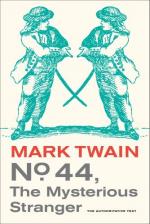|
This section contains 7,008 words (approx. 24 pages at 300 words per page) |

|
SOURCE: "The Epistemological Theme of The Mysterious Stranger," in Themes and Directions in American Literature, edited by Ray B. Browne and Donald Pizer, Purdue University Press, 1969, pp. 130-47.
In the following essay, Glick analyzes various lines of philosophical argument in The Mysterious Stranger.
Among the scores of literary fragments which accumulated around Mark Twain in the terminal years of his life—most of them vilifications of democratic man and democratic society—stands The Mysterious Stranger, bitter like the rest, but bitter with a difference. For while most of these fragments impress the reader as little more than the vituperative tirades of the idealist turned sour as a consequence of the demise in his old age of his youthful hopes and expectations, or perhaps of his belated recognition of the discrepancy between the ideal and the actual, The Mysterious Stranger, though it contains a measure of such raillery, does...
|
This section contains 7,008 words (approx. 24 pages at 300 words per page) |

|


